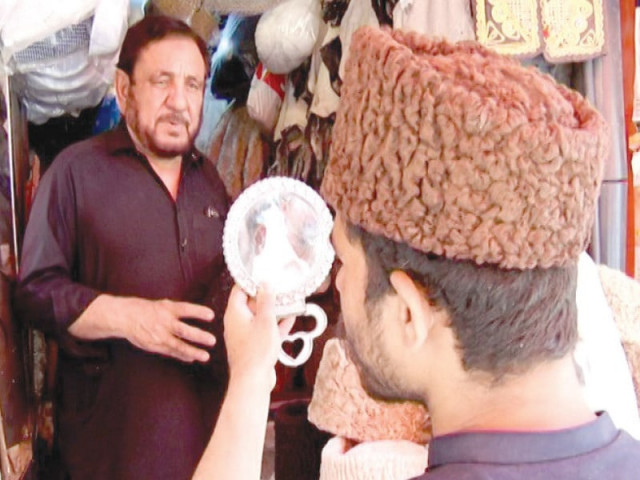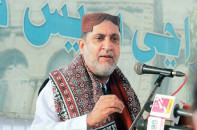Jinnah Cap: Peshawar’s fading cultural icon
Artisans in Qissa Khawani Bazaar used to craft these caps

The tradition of wearing the Jinnah cap, a cherished element of Peshawar’s rich cultural heritage, is now on the brink of extinction. Once a symbol of pride in a city renowned for its historical beauty, the Jinnah cap has all but disappeared from the local market.
Today, only a single shop in Peshawar’s historic Qissa Khawani Bazaar continues to sell Jinnah caps. The other shops in Ghanta Ghar, once bustling with traditional cap makers, have closed down or shifted to more commercially viable businesses.
Ustad Bashir, the craftsman behind the last remaining Jinnah cap shop in Peshawar, shared his story with The Express Tribune. The Jinnah cap, made from sheepskin and adored by Quaid-e-Azam Muhammad Ali Jinnah, was once an essential part of wedding attire in Peshawar. Grooms would don the cap along with the famous boski suit. In the past, Ustad Bashir sold 10 to 15 Jinnah caps daily; now, he struggles to sell two to three caps in two months.
Artisans in Qissa Khawani Bazaar used to craft these caps, which were then sent as souvenirs to notable figures in countries like America, France, Italy, and Germany. However, the number of people who wear and make the Jinnah cap has dwindled significantly.
Ustad Bashir reminisced about the days when the Jinnah cap was a thriving small industry in Ghanta Ghar and Qissa Khwani. The market once housed around 100 shops dedicated to making these caps. As demand decreased, many artisans switched to other trades. “As long as I am alive, my shop will exist for the love of Quaid-i-Azam,” Ustad Bashir declared, vowing to keep the tradition alive despite the challenges.
This decline in the Jinnah cap’s popularity reflects broader changes in cultural practices and commercial realities, yet Ustad Bashir’s dedication offers a poignant reminder of the rich heritage that still resides in Peshawar.
Jamshed, a resident of Mohalla Khudadad in Peshawar, shared that his forefathers traditionally wore the Jinnah cap on special occasions such as Eid, weddings, and major family functions. The Jinnah cap was considered a symbol of honor and an integral part of local culture. He recalled that elders would don the cap and participate in gatherings, but over the past 10 to 15 years, this tradition has seen a slow yet steady decline.
In the past, locals wore various kinds of caps and turbans, but today’s younger generations are less inclined to cover their heads, a practice once deemed almost obligatory.
Historically, the Jinnah cap has been considered a part of the national dress. Notable figures such as Quaid-e-Azam Muhammad Ali Jinnah, General Ayub Khan, Zulfiqar Ali Bhutto, Liaquat Ali Khan, and Qazi Hussain Ahmed wore the Jinnah cap, cementing its status as a symbol of prestige.
Recently, the President of Pakistan, Asif Ali Zardari, was gifted a Jinnah cap by party leaders during his visit to Khyber Pakhtunkhwa.
Published in The Express Tribune, May 22nd, 2024.



















COMMENTS
Comments are moderated and generally will be posted if they are on-topic and not abusive.
For more information, please see our Comments FAQ